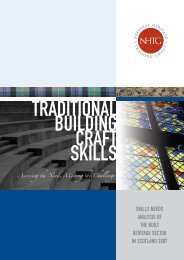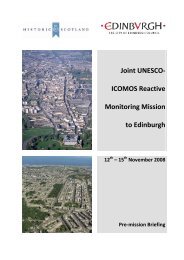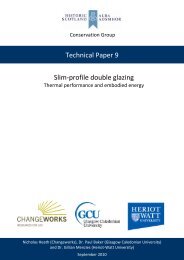NTS Report 4 Aug 2010 - National Trust for Scotland
NTS Report 4 Aug 2010 - National Trust for Scotland
NTS Report 4 Aug 2010 - National Trust for Scotland
Create successful ePaper yourself
Turn your PDF publications into a flip-book with our unique Google optimized e-Paper software.
34<br />
Putting People First<br />
Staff Morale and Motivation are foundations <strong>for</strong> the future<br />
The 456 permanent and 755 seasonal staff of the <strong>National</strong> <strong>Trust</strong><br />
<strong>for</strong> <strong>Scotland</strong> (as of 30 June <strong>2010</strong>) possess a remarkable range of<br />
skills and experience. After extensive interviews and meetings,<br />
the Review is clear that the vast majority love their job and do<br />
not want to do anything else.<br />
If they are not enthused and motivated, <strong>NTS</strong> will flounder.<br />
We agree totally with the Chief Executive and the Leadership<br />
Team on the priority need to address staff morale, motivation,<br />
pay and conditions.<br />
Ms Mavor took up her post in the week when the 2009<br />
redundancies were announced. Initially, these were poorly<br />
implemented and badly communicated. In retrospect, some of<br />
the cuts probably went too deep. They impacted adversely on the<br />
charity’s ability to generate grants and donations.<br />
In some cases, work previously undertaken in house has had to<br />
be outsourced to external contractors at significantly more<br />
expense.<br />
An independent review conducted by Employ Surveys in<br />
November 2009, at the initiative of the new Chief Executive,<br />
revealed morale to be at rock bottom.<br />
There was a deep lack of confidence in the then Leadership<br />
Team, with under a quarter of staff believing that the <strong>Trust</strong> had a<br />
clear sense of strategic direction.<br />
Over a third of staff commented that they were experiencing<br />
health problems because of stress at work. Almost two-thirds<br />
said they had not had a per<strong>for</strong>mance appraisal during the<br />
previous year. And less than a fifth believed they had good<br />
career prospects.<br />
On the bonus side, a remarkable 90% of staff said that they<br />
loved their job. A big majority felt that communications within<br />
their own department and line managers was good.<br />
It is to the credit of the current Leadership Team that they have<br />
started to address these issues. They are developing a more<br />
participative culture, doing things with staff rather than – as one<br />
employee’s submission put it – ‘doing things to them’.<br />
Considerable problems still remain, however, over staff pay and<br />
conditions.<br />
Many staff are in the bottom quartile <strong>for</strong> the voluntary and<br />
public sectors. Their position relative to others doing<br />
comparable work has progressively worsened over the past<br />
decade. There was no pay award last year.<br />
We recognise that negotiations are currently ongoing with the<br />
staff trade union to start to address these issues and that it is<br />
90% of <strong>NTS</strong> staff love their<br />
job. But only 19% believe<br />
they have good career<br />
prospects.<br />
- Independent attitudes survey Nov 2009<br />
The range of skills and knowledge of <strong>NTS</strong> staff is enormous, and a<br />
valuable national resource. Here an operator sorts type in Robert<br />
Smail’s Victorian Letterpress print shop in Innerleithen which, thanks<br />
to the <strong>Trust</strong>, is still operational today.<br />
unlikely these will be concluded be<strong>for</strong>e this report is published.<br />
We welcome this development.<br />
We are aware of the stated intention of the Board to have a<br />
surplus budget from <strong>2010</strong> onwards and appreciate that an award<br />
which starts to address some of the unfairness in the present<br />
situation would push the <strong>Trust</strong> into deficit.<br />
Because staff morale and motivation are so essential to the<br />
future wellbeing of <strong>NTS</strong>, however, we believe this is an<br />
investment worth making.<br />
We are clear that an independent report is needed to in<strong>for</strong>m<br />
<strong>Trust</strong>ees and members on strategic decisions which require to be<br />
taken on staff pay and conditions.<br />
We believe it is important to review these issues across the<br />
Heritage sector and recommend accordingly on page 32.<br />
Next Steps<br />
We acknowledge the work of the Chief Executive to engage<br />
with staff and to communicate with them all in a weekly report.<br />
We endorse senior management’s commitment to ensuring that<br />
all staff have an annual appraisal and to opening full discussions<br />
on career progression.<br />
We recognise that a change in corporate culture will take time.<br />
But we believe that the capability model of planning which we<br />
propose in this report – agreeing a common mission, setting<br />
clear strategic direction, concentrating on achievable and<br />
measurable annual targets after consultation at personal and<br />
departmental levels – is the way to focus staff engagement and<br />
improve morale.<br />
We are also conscious of a silo mentality within departments at<br />
headquarters which has developed over the years among<br />
employees.<br />
The design and layout of Wemyss House – offices up different<br />
stairs, with different front doors – has encouraged such attitudes.<br />
Open planning of work space at Hermiston Quay should present<br />
new opportunities <strong>for</strong> more joined up working and horizontal<br />
collaboration across departments.


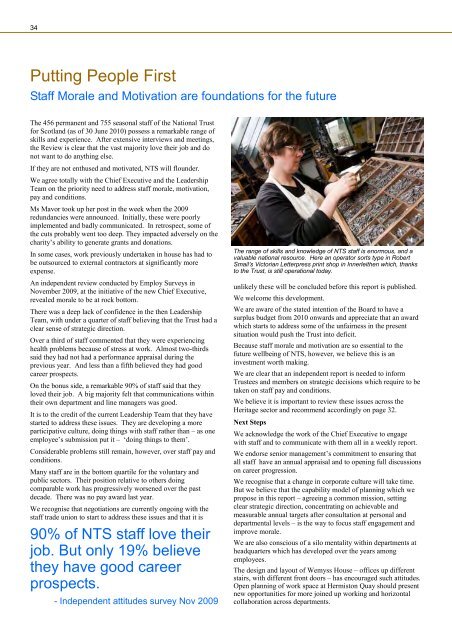
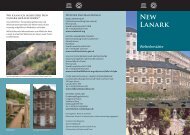
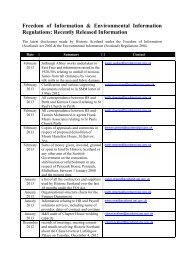
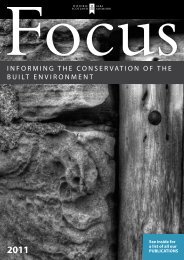
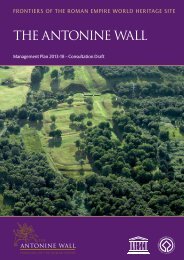
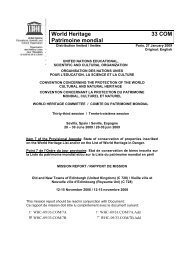
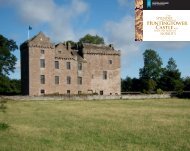

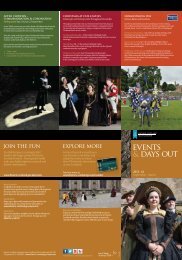
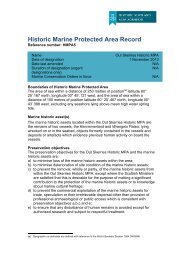
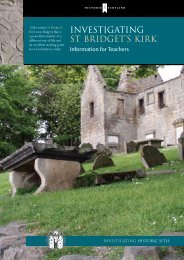
![Elgin Cathedral Wedding Brochure [pdf, 544kb] - Historic Scotland](https://img.yumpu.com/22301571/1/190x151/elgin-cathedral-wedding-brochure-pdf-544kb-historic-scotland.jpg?quality=85)

